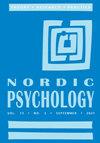A preliminary investigation of intellectual humility as a protective factor for maladaptive personality traits
IF 1.1
4区 心理学
Q4 PSYCHOLOGY, MULTIDISCIPLINARY
引用次数: 0
Abstract
Abstract Personality disorders are a major public health concern that onset during adolescence and young adulthood. There has been a recent interest in studying the role of positive psychology constructs in personality pathology. A positive psychology construct that has been tested in conjunction with normative personality traits, but not yet maladaptive personality traits, is intellectual humility (IH). Evaluating links between IH and maladaptive personality traits would advance prior research and could also inform new prevention and intervention strategies for personality pathology, as well as increase clinical applications for IH. The current study therefore aimed to examine associations between IH and the five maladaptive traits outlined in the Alternative Model of Personality Disorders from Section III of the DSM-5: negative affect, detachment, antagonism, disinhibition, and psychoticism. The sample included 897 young adults between the ages of 18–25 (79.8% female), who completed the five-factor Personality Inventory for DSM-5 and the three-factor Intellectual Humility Scale as part of a cross-sectional online study. Five hierarchical regression models were evaluated. All five maladaptive traits were significantly and inversely predicted by at least one of the three IH domains, over and above age and gender. Relative to the other maladaptive traits, antagonism had the greatest amount of variability explained (23.7%) by IH factors (compared to the 4–10% variance explained in the other traits). Clinical implications, particularly for personality disorders that involve antagonism, and future research directions are discussed.智力谦逊作为适应不良人格特征保护因素的初步研究
人格障碍是青春期和青年期发病的主要公共卫生问题。最近有一个研究积极心理学构念在人格病理学中的作用的兴趣。一个积极心理学的概念已经和规范性人格特质一起测试过了,但还没有和适应不良人格特质一起测试过,那就是智力谦卑(IH)。评估IH和适应不良人格特征之间的联系将推进先前的研究,也可以为人格病理学提供新的预防和干预策略,并增加IH的临床应用。因此,目前的研究旨在检查IH与DSM-5第三节人格障碍替代模型中概述的五种适应不良特征之间的关系:负面影响、脱离、对抗、去抑制和精神病。样本包括897名年龄在18-25岁之间的年轻人(79.8%为女性),他们完成了DSM-5的五因素人格量表和三因素智力谦卑量表,作为横断面在线研究的一部分。评估了五种层次回归模型。所有五种不适应性状均与三个IH结构域中的至少一个显著负相关,且高于年龄和性别。相对于其他不适应性状,拮抗因子的变异率最大(23.7%)(其他性状的变异率为4-10%)。临床意义,特别是对人格障碍涉及拮抗和未来的研究方向进行了讨论。
本文章由计算机程序翻译,如有差异,请以英文原文为准。
求助全文
约1分钟内获得全文
求助全文

 求助内容:
求助内容: 应助结果提醒方式:
应助结果提醒方式:


